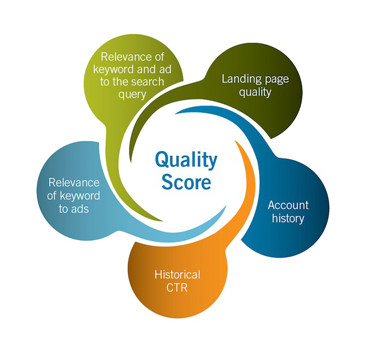We help you assess the effectiveness of each channel you may have used, by objectively measuring the impact achieved in the separate media streams; be it the advertising you did on owned space, the one that you paid to display or the one that you earned in the form of discussions surrounding your product, which you have gained from advertising.

Quality Score is Google's measure of the relevance of your keywords, used to ensure that searchers see relevant ads and have a positive experience. The factors that determine your Quality Score include:
It's important to maintain good Quality Scores because Google uses them to determine your ad rankings as well as how much you pay per click. Even if you think you've dotted your i's and crossed your t's when it comes to keyword research, campaign structure, and ad text optimization, low average Quality Scores are an indication that you're missing some piece of the puzzle.

Recently, We observed the top three PPC metrics they pay the most attention to when analyzing their AdWords accounts. Click-through rate was the #1 most common answer. CTR is important for several reasons, among them:
Low click-through rates are a sign that either your keywords or your ad creative (or both) need improvement.
Another very popular answer in our PPC metrics interview, conversion rate tells you how many people who clicked your ad went on to complete the desired action on your landing page, whether it was making a purchase, signing up for a free trial, or filling out some other kind of form. Conversion rate is just as important as click-through rate – you don't want to pay for tons of clicks and traffic if none of that traffic ends up taking a meaningful action. Strong conversion rates mean that the money you spend per click is coming back to you in profits (that's what we call return on investment, folks).
As "This obviously is the number that makes or breaks a campaign from a success/failure standpoint." In other words, if you have to pay more to gain a new customer than that customer is actually worth to your business, then your campaign is failing; you haven't attained a return on investment.
Wasted spend is a measure of how much money you're essentially pouring down the toilet by paying for clicks that don't convert. In other words, it's an ROI killer. The best way to reduce your wasted spend is through smart use of negative keywords. Negative keywords allow you to filter out traffic that is irrelevant to your business and unlikely to convert. By creating a negative keyword, you're preventing your ads from displaying for search queries that contain that keyword. Bidding on non-converting keywords is a waste of your marketing budget.
Want a quick way to check your performance for key metrics like these? The AdWords Performance Grader is a free tool that performs an instant PPC audit on your AdWords account, comparing your performance in areas like Quality Score and wasteful spending to other advertisers in the same budget range. It's an easy way to see how you measure up to competitors and to benchmark your campaigns so you can track changes (hopefully improvements) in your results over time.